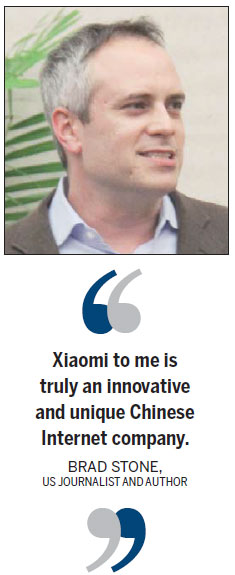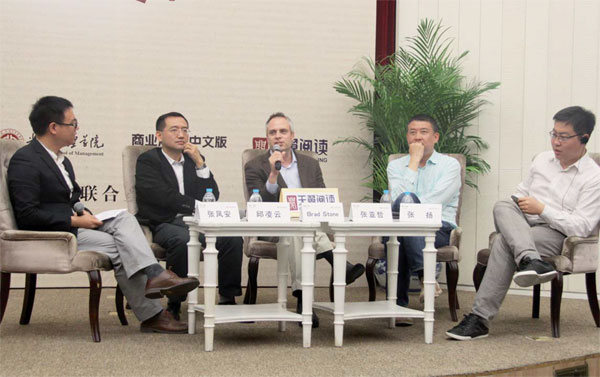China arrives on the cutting edge
Updated: 2014-06-20 08:10
By Chen Yingqun (China Daily Europe)
|
|||||||||||
|
Brad Stone talked with Internet experts and students at Peking University recently about the Chinese Internet industry and his experience in writing a book about Amazon. Provided to China Daily |
Dim view of country's capacity for innovation is a thing of the past, high-tech writer says
Frequent claims that Chinese technology companies lack innovation may no longer be true, says Brad Stone, a US journalist who writes about technology.
"Unfairly enough, people in the West once thought Chinese technology companies were not doing anything particularly innovative," he says. "I've been struck on this trip by how that is really not the case anymore."
Stone talked with Internet experts and students at Peking University recently about the Chinese Internet industry and his experience in writing the book The Everything Store: Jeff Bezos and the Age of Amazon, about the Internet company founder.
Stoned has written about technology for 15 years. He first worked for Newsweek magazine, then The New York Times and is now a senior writer for Bloomberg Businessweek. His coverage includes leading technology companies, such as Apple, Google, Facebook, Twitter and Amazon.
Stone says he visits China every couple of years to learn about the latest Internet trends, and has done stories about Baidu and Tencent. On his most recent trip he was to do research on Xiaomi Group, a four-year-old Chinese company that the US business magazine Fast Company recently ranked as No 3 in the top 50 most innovative companies in the world.
Xiaomi, which makes smart phones, has no physical retail outlets, and it had online sales worth $10 billion over the past three years.
"Xiaomi to me is truly an innovative and unique Chinese Internet company," Stone says. "It basically rethought all the ways that you might manufacture a phone and then market a phone, so they don't sell in stores, they don't advertise on television. They kind of rethought the entire supply chain and the entire way that a phone is made. It is very well representative of the Chinese technology industry. At one point, maybe it was derivative of what is happening in the West, in some ways, when you look at Alibaba and Tencent that are leading the way. There are many Internet companies around the world that are watching China closely right now to see what is happening here and then bring it to the West."

Stone says the career of Lei Jun, CEO and founder of Xiaomi, is a good illustration of how the Chinese Internet industry has evolved. He started his career at the software company Kingsoft, which, Stone says, was not particularly innovative at the beginning and in some ways was simply following in Microsoft's suit, although the company went public many years later. He invested in the online bookseller Zhuoyue.com, which was not particularly innovative either and which Amazon bought later and turned into Amazon.cn. But what is fascinating about Lei is how he resigned as CEO of the software company Kingsoft and kept trying to work out how to build a true Internet company, Stone says.
Lei would carry a bag of 20 cell phones around with him and try to learn everything he could about them, he says. After the first iPhone came out seven years ago he bought 20 of them and gave them to 20 friends and asked them what they thought of them.
Stone says that Lei is similar to Bezos, who is analytical and strategic about the market, and thinks about how he can improve it, and how to more than innovate, coming up with small features that may make a difference.
Stone has been in China promoting the Bezos book, which won the Financial Times and Goldman Sachs Business Book of the Year Award last year and was published in China in January. The book looks at how Bezos has built Amazon into an e-commerce empire over 20 years and how it has changed people's shopping and reading habits. Stone says he interviewed more than 300 of Bezos' colleagues, senior executives, friends, family and others. He interviewed Bezos 10 times.
Stone says that when he was in Silicon Valley, many great books were written about Apple, Google, and Facebook, but no one had written about Amazon, even though it was a lot older than Google and Facebook.
"But in the US and Europe, Amazon was the first company on the Internet that you knew about. It changed the way people shopped, it changed the way we read, and it has recently changed the way that companies operate."
Amazon was founded in Seattle in 1995. It pioneered selling books online, offering stiff competition to traditional booksellers, and has developed in many areas, selling millions of products, not just books, and is the biggest Internet company in the world, Stone says.
"The important thing to understand with Amazon is not big innovations; it is focused on small things, small features. Bezos once said, 'We don't have many big advantages, but we have to weave all the smaller advantages.' To me this is very representative of how Amazon operates."
Though Amazon is a big company with enormous sales, its rate of return is small, Stone says, but Bezos' aim is not to make more money for shareholders, but to be very patient and ambitious about the market.
As more companies have gone into e-commerce, online shopping has been widely adopted, Bezos started to lead Amazon into new areas such as building its own supply chain, investing in the electronic reader Kindle and cloud computing Amazon Web Server, Stone says.
"Amazon is very profitable, but they reinvest profits in growth in new countries and new products."
Bezos can be very strict and even harsh with employees, Stone says. "He's angry if an employee doesn't pick up a phone in time. He has many unique ways of running operations. For example, there's no slideshow or PowerPoint in the company. They start every meeting by reading a document, and then discuss problems, because Bezos thinks PowerPoint presentations are a distraction."
But he goes out of his way to keep customers satisfied, Stone says. Amazon told one customer who bought a pair of trousers and found they were too big to keep them and get another pair.
Zhang Yazhe, partner of the seed fund ZhenFund, says many companies have learned from Amazon, for example in improving shipping.
"I've been to many e-commerce warehouses, such as Jingdong and Dangdang.com, but when you visit Amazon warehouses you realize it is years ahead of Chinese companies."
Qiu Lingyun, a professor of Guanghua School of Management of Peking University, says Bezos' personality and passion may be inspiring many Chinese. Reading the book, a reader may think he is "a crazy Internet entrepreneur", but many of his ideas that may have seemed crazy have been realized.
Mackenzie Bezos, wife of the CEO, has given Stone a one-star rating, the lowest, on Amazon. But Stone says he is quite proud of receiving that response.
"Amazon is a very controversial company, very polarizing. Customers love it; they can be very passionate about it. But you talk to anyone in book publishing in New York, or a small local bookseller who tries to serve the community they hate Amazon."
chenyingqun@chinadaily.com.cn
(China Daily European Weekly 06/20/2014 page28)
Today's Top News
Businesses look forward to visit
Classic Greece lures Chinese
Port a good example of China deal
Greek PM salutes 'a game changer'
Young at heart, and they love art
China's Arctic shipping shortcut
Evacuation plans made for Chinese workers in Iraq
Energy costs to hit $5.7t
Hot Topics
Lunar probe , China growth forecasts, Emission rules get tougher, China seen through 'colored lens', International board,
Editor's Picks

|

|

|

|

|

|






